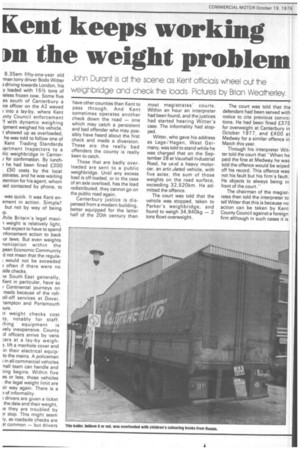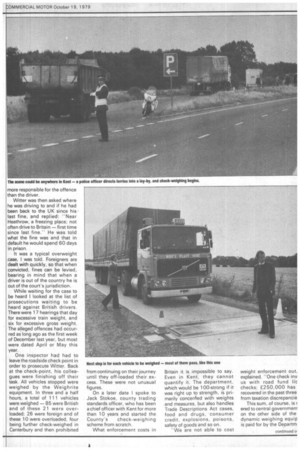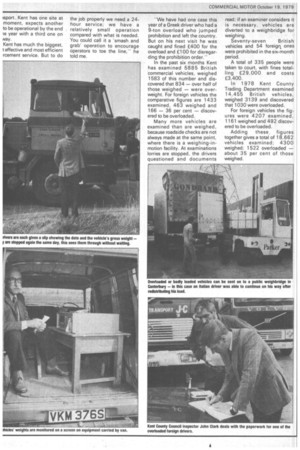Kent keeps working
Page 64

Page 65

Page 66

If you've noticed an error in this article please click here to report it so we can fix it.
NM the weight problem
John Durant is at ne scene as Kent officials wheel out ne weighbridge and check ne loads. Pictures by Brian Wea erley.
8.35am fifty-one-year old -man lorry driver Bodo Witter 3driving towards London, his y loaded with 151/2 tons of leless frozen cow. Some five es south of Canterbury a cc officer on the A2 waved I into a lay-by, where Kent inty Council enforcement :f with dynamic weighing ipment weighed his vehicle. t showed up as overloaded, he was told to follow one of Kent Trading Standards )artment Inspectors to a lic weighbridge in Canter/ for confirmation. By lunch) he had been fined £300
£50 costs by the local listrates, and he was waiting atention for his agent, whom lad contacted by phone, to was quick. It was Kent enement in action. Simple? but not by way of being ip.
/hile Britain's legal maxi] weight is relatively light, lust expect to have to spend nforcement action to back ur laws. But even weights Ionization within the pean Economic Community d not mean that the regula; would not be exceeded often if there were no ;ide checks.
le South East generally, Kent in particular, have so Continental journeys on roads because of the rolloil-off services at Dover, lampton and Portsmouth )1irS.
it weight checks cost notably for staff.
Ihing equipment is vely inexpensive. County .;i1 officers arrive by vans cars at a lay-by weigh?, lift a manhole cover and in their electrical equipto the mains. A policeman ; in all commercial vehicles -nail team can handle and Iing begins. Within five es or less, those vehicles the legal weight limit are air way again. There is a a of informality.
drivers are given a ticket the date and their weight, ie they are troubled by stop. This might seem as roadside checks are at common — but drivers have other counties than Kent to pass through. And Kent sometimes operates another check down the road — one which may catch a persistent and bad offender who may possibly have heard about the first check and made a diversion. These are the really bad offenders the county is really keen to catch.
Those that are badly overloaded are sent to a public weighbridge. Until any excess load is off-loaded, or in the case of an axle overload, has the load redistributed, they cannot go on the public road again.
Canterbury justice is dispensed from a modern building, better equipped for the latter half of the 20th century than most magistrates' courts. Within an hour an interpreter had been found, and the justices had started hearing Witter's case. The informality had stopped.
Witter, who gave his address as Lage/ Hagen, West Germany, was told to stand while he was charged that on the September 28 at Vauxhall Industrial Road, he us ad a heavy motorcar, an articulated vehicle, with five axles, the sum of those weights on the road surface, exceeding 32,520km. He admitted the offence.
The court was told that the vehicle was stopped, taken to Parker's weighbridge, and found to weigh 34,940kg — 2 tons 6cwt overweight. The court was told that the defendant had been served with notice to cite previous convictions. He had been fined £375 for overweight at Canterbury in October 1977, and £400 at Medway for a similar offence in March this year.
Through his interpreter Witter told the court that -When he paid the fine at Medway he was told the offence would be wiped off his record. This offence was not his fault but his firm's fault. He objects to always being in front of the court.
The chairman of the magistrates then told the interpreter to tell Witter that this is because no action can be taken by Kent County Council against a foreign firm although in such cases it is more responsible for the offence than the driver.
Witter was then asked where he was driving to and if he had been back to the UK since his last fine, and replied: "Near Heathrow, a freezing place; not often drive to Britain — first time since last fine." He was told what the fine was and that in default he would spend 60 days in prison.
It was a typical overweight case, I was told. Foreigners are dealt with quickly, so that when convicted, fines can be levied, bearing in mind that when a driver is out of the country he is out of the court's jurisdiction.
While waiting for the case to be heard I looked at the list of prosecutions waiting to be heard against British drivers, There were 17 hearings that day for excessive train weight, and six for excessive gross weight. The alleged offences had occurred as long ago as the first week of December last year, but most were dated April or May this year.
One inspector had had to leave the roadside check point in order to prosecute Witter. Back at the check-point, his colleagues were finishing off their task. All vehicles stopped were weighed by the Weighrite equipment. In three and a half hours, a. total of 111 vehicles were weighed — 85 were British and of these 21 were overloaded; 26 were foreign and of these 10 were overloaded, four being further check-weighed in Canterbury and then prohibited from continuing on their journey until they off-loaded their excess. These were not unusual figures.
On a later date I spoke to Jack Stokoe, county trading standards officer, who has been a chief officer with Kent for more than 10 years and started the County's check-weighing scheme from scratch.
What enforcement costs in Britain it is impossible to say. Even in Kent, they cannot quantify it. The department, which would be 100-strong if it was right up to strength, is primarily concerned with weights and measures. but also handles Trade Descriptions Act cases, food and drugs, consumer credit, explosions, poisons, safety of goods and so on.
"We are not able to cost
weight enforcement out, explained. -One check inv us with road fund lic checks; £250,000 has recovered in the past three from taxation discrepancie
This sum, of course, is r ered to central governmeni on the other side of the dynamic weighing equip is paid for by the Departm isport. Kent has one site at moment, expects another to be operational by the end le year with a third one on Nay.
Kent has much the biggest, t effective and most efficient rcement service. But to do
the job properly we need a 24hour service; we have a relatively small operation compared with what is needed. You could call it a 'smash and grab' operation to encourage operators to toe the line,he told me. -We have had one case this year of a Greek driver who had a 9-ton overload who jumped prohibition and left the country. But on his next visit he was caught and fined £400 for the overload and £100 for disregarding the prohibition order.
In the past six months Kent has examined 5885 British commercial vehicles, weighed 1 583 of this number and discovered that 834 — over half of those weighed — were overweight. For foreign vehicles the comparative figures are 1433 examined, 463 weighed and 166 — 36 per cent — discovered to be overloaded.
Many more vehicles are examined than are weighed, because roadside checks are not always made at the same point, where there is a weighing-inmotion facility. At examinations lorries are stopped, the drivers questioned and documents read; if an examiner considers it is necessary, vehicles are diverted to a weighbridge for weighing.
Seventy-seven British vehicles and 54 foreign, ones were prohibited in the six-month period.
A total of 335 people were taken to court, with fines totalling £29,000 and costs £3,400.
In 1978 Kent County Trading Department examined 14,455 British vehicles, weighed 3139 and discovered that 1030 were overloaded.
For foreign vehicles the figures were 4207 examined, 1161 weighed and 492 discovered to be overloaded.
Adding these figures together gives a total of 18,662 vehicles examined; 4300 weighed; 1522 overloaded — about 35 per cent of those weighed.












































































































































